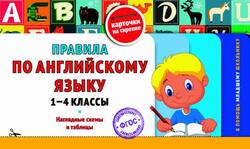In this course, you’ll learn how to move beyond definitional vocabulary knowledge toward a rich vocabulary that’s broad, deep, and flexible and lasts a lifetime. To do this, we’ll cover five core principles of vocabulary learning in the first lecture. These principles will serve as tools in your vocabulary toolbox that you can apply as we explore new target words throughout the course. You will use these tools to learn word meanings deeply so that you’ll remember and be able to use the words years from now.
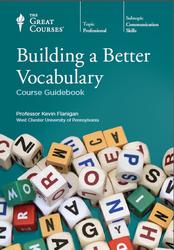
The Spelling-Meaning Connection.
In our first lecture, we discussed five core principles of effective vocabulary learning: starting with clear definitions, putting words into context, making connections between known concepts and new words, exploring the morphology and etymology of words, and chunking words by meaning in our mental lexicons. This last principle takes advantage of the fact that our minds organize information, including words, according to schema, or mental file folders. In this lecture, we’ll delve a bit deeper into the morphological system of English to explore one of the big “secrets” of vocabulary learning: Just as our minds organize language, so, too, language has a system for organizing words.
One of the keys to unlocking this morphological system is a concept known as the spelling-meaning connection, a term coined by vocabulary researcher Shane Templeton. Think of morphology as the umbrella term here, and the spelling-meaning connection as an important tool we can use to decode that system. The spelling-meaning connection also shows us that our spelling system makes more sense than you may think.
Contents.
INTRODUCTION.
Professor Biography.
Course Scope.
LECTURE 1 Five Principles for Learning Vocabulary.
LECTURE 2 The Spelling-Meaning Connection.
LECTURE 3 Words for Lying, Swindling, and Conniving.
LECTURE 4 Words That Express Annoyance and Disgust.
LECTURE 5 Fighting Words and Peaceful Words.
LECTURE 6 Going beyond Dictionary Meanings.
LECTURE 7 Wicked Words.
LECTURE 8 Words for Beginnings and Endings.
LECTURE 9 Words Expressing Fear, Love, and Hatred.
LECTURE 10 Words for the Everyday and the Elite.
LECTURE 11 Words from Gods and Heroes.
LECTURE 12 Humble Words and Prideful Words.
LECTURE 13 High-Frequency Greek and Latin Roots.
LECTURE 14 Words Relating to Belief and Trust.
LECTURE 15 Words for the Way We Talk.
LECTURE 16 Words for Praise, Criticism, and Nonsense.
LECTURE 17 Eponyms from Literature and History.
LECTURE 18 Thinking, Teaching, and Learning Words.
LECTURE 19 Words for the Diligent and the Lazy.
LECTURE 20 Words That Break and Words That Join.
LECTURE 21 Some High-Utility Greek and Latin Affixes.
LECTURE 22 Cranky Words and Cool Words.
LECTURE 23 Words for Courage and Cowardice.
LECTURE 24 Reviewing Vocabulary through Literature.
LECTURE 25 Words for Killing and Cutting.
LECTURE 26 A Vocabulary Grab Bag.
LECTURE 27 Words for Words.
LECTURE 28 Specialty Words for Language.
LECTURE 29 Nasty Words and Nice Words.
LECTURE 30 Words for the Really Big and the Very Small.
LECTURE 31 Spelling as a Vocabulary Tool.
LECTURE 32 A Medley of New Words.
LECTURE 33 Building Vocabulary through Games.
LECTURE 34 Words English Borrowed and Never Returned.
LECTURE 35 More Foreign Loan Words.
LECTURE 36 Forgotten Words and Neologisms.
Бесплатно скачать электронную книгу в удобном формате, смотреть и читать:
Скачать книгу Building a Better Vocabulary, Course Guidebook, Flanigan K., 2015 - fileskachat.com, быстрое и бесплатное скачивание.
Скачать pdf
Ниже можно купить эту книгу, если она есть в продаже, и похожие книги по лучшей цене со скидкой с доставкой по всей России.Купить книги
Скачать - pdf - Яндекс.Диск.
Дата публикации:
Теги: учебник по английскому языку :: английский язык :: Flanigan
Смотрите также учебники, книги и учебные материалы:
Следующие учебники и книги:
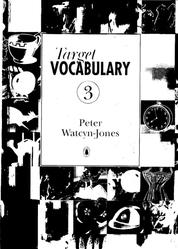 Target Vocabulary 3, Watcyn-Jones P., 1995 — Target Vocabulary 3 is the third book in a new vocabulary series. It introduces and practises approximately 1,200 new words … Книги по английскому языку
Target Vocabulary 3, Watcyn-Jones P., 1995 — Target Vocabulary 3 is the third book in a new vocabulary series. It introduces and practises approximately 1,200 new words … Книги по английскому языку English through pictures, Book 3, Richards I.A., Gibson C.M., 2005 — This is a new book in a series whose English Through Pictures, Books I and II have been used by … Книги по английскому языку
English through pictures, Book 3, Richards I.A., Gibson C.M., 2005 — This is a new book in a series whose English Through Pictures, Books I and II have been used by … Книги по английскому языку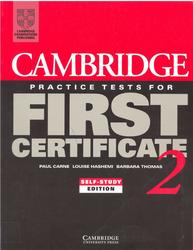 Cambridge Practice Tests for First Certificate 2, Carne P., Hashemi L., Thomas B., 1996 — The First Certificate in English (FCE) is an examination at intermediate level which is offered by UCLES (the University of … Книги по английскому языку
Cambridge Practice Tests for First Certificate 2, Carne P., Hashemi L., Thomas B., 1996 — The First Certificate in English (FCE) is an examination at intermediate level which is offered by UCLES (the University of … Книги по английскому языку The Tenses, the Aspects, and the Voices of the English Language, Brown M., 2017 — Фрагмент из книги: A ‘tense’ is a form of a verbal group that indicates either (1) the past time, (2) … Книги по английскому языку
The Tenses, the Aspects, and the Voices of the English Language, Brown M., 2017 — Фрагмент из книги: A ‘tense’ is a form of a verbal group that indicates either (1) the past time, (2) … Книги по английскому языку
Предыдущие статьи:
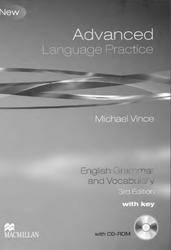 Advanced Language Practice, Vince M., 2009 — This book is designed to revise and consolidate grammar points at the level of Cambridge ESOL Proficiency and CAE or … Книги по английскому языку
Advanced Language Practice, Vince M., 2009 — This book is designed to revise and consolidate grammar points at the level of Cambridge ESOL Proficiency and CAE or … Книги по английскому языку Insight, Pre-Intermediate Student’s Book, Wildman J., Beddall F. — Insight, Pre-Intermediate Student s Book, Wildman J., Beddall F. The insight Student s Book is packed full of thought-provoking topics … Книги по английскому языку
Insight, Pre-Intermediate Student’s Book, Wildman J., Beddall F. — Insight, Pre-Intermediate Student s Book, Wildman J., Beddall F. The insight Student s Book is packed full of thought-provoking topics … Книги по английскому языку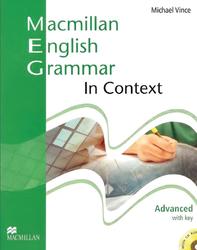 Macmillan English Grammar In Context, Advanced, With key, Vince M., 2008 — This book is designed to revise and consolidate grammar points at the level of Council of Europe Framework (CEF) Cl … Книги по английскому языку
Macmillan English Grammar In Context, Advanced, With key, Vince M., 2008 — This book is designed to revise and consolidate grammar points at the level of Council of Europe Framework (CEF) Cl … Книги по английскому языку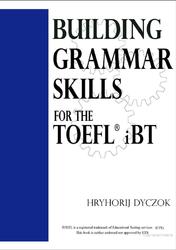 Building Grammar Skills for TOEFL, Dyczok H., 2007 — Фрагмент из книги. The verb in the sentence describes the subject or describes the action of the subject. The verb … Книги по английскому языку
Building Grammar Skills for TOEFL, Dyczok H., 2007 — Фрагмент из книги. The verb in the sentence describes the subject or describes the action of the subject. The verb … Книги по английскому языку

